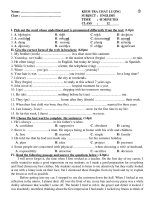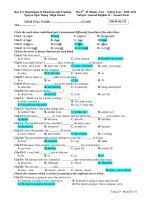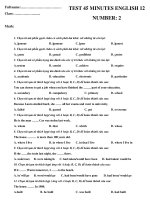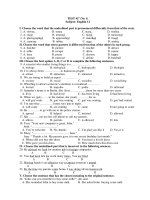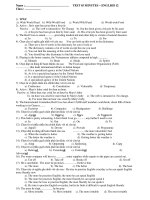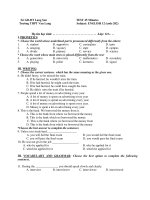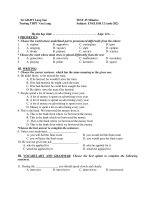English 12 45
Bạn đang xem bản rút gọn của tài liệu. Xem và tải ngay bản đầy đủ của tài liệu tại đây (96.54 KB, 3 trang )
TEST
Full name : ……………………………………………
Class : ………….
I. Which word has the different stress pattern from the rest
1.A. education
B. preparation
C. economics
D. technology
2.A. expression
B. depression
C. easily
D. division
II. Which word has the underlined part pronounced differently from the rest
1.A. employers
B. weekends
C. reasons
D. photographs
2.A. stopped
B. answered
C. believed
D. determined
3.A. society
B. initiate
C. international
D. protection
III. Choose the best answer.
1. By next week, they ____________ resurfacing the road.
A. will have finished B. will finish
C. will be finishing
D. finish
2. I __________ here for hours and I feel tired.
A. stood
B. have been stood
C. have been standing D. am standing
3. I can’t remember the name of the hotel __________ we stayed at.
A. where
B. which
C. when
D. whose
4. Mai: “Wow, I’ve never seen such a nice cell phone, Nam”
Nam: “_______________________”.
A. Oh, I don’t know. B. Thank you. I’m glad you like it. C. You’re welcome. D. I agree with you.
5. “_________” is used to express disagreement.
A. I couldn’t disagree with you any more.
B. That’s what I’m not thinking of
C. That’s the way I see it
D. That’s not a good idea.
6. The princess was happy during the years _________ she lived with the fairy.
A. where
B. in which
C. when
D. that
7. Jane said she _________ 20 the following week.
A. will be
B. would be
C. was
D. is
8. I can’t play _________ piano, but I can play_________ guitar.
A. a – the
B. the – the
C. the – a
D. an – a
9. Martin grew to be very _________ of her pet snake.
A. keen
B. fond
C. interested
D. satisfied
10. Windmills _________ by the Persians around 1500 years ago.
A. were invented
B. are invent
C. invented
D. are invented
11. He says that he _________his homework since 5 o’clock.
A. has done
B. was doing
C. did
D. had done
12. A person who expects bad things to happen is ________.
A. Pessimistic
B. optimist
C. optimistic
D. pessimist
13. _________ she had agreed, you would have done it.
A. If not
B. Despite
C. If
D. Because of
14. He _________ be late for the train unless he starts at once.
A. would
B. will
C. shall
D. might
15. You can either come _________ bus or take a taxi.
A. by
B. on
C. in
D. under
16. Ha Noi, __________, is the capital of Vietnam.
A. which is my hometown
B. where I was born there C. which I was born 0
D. that is my hometown
17. My car still runs surprisingly well __________ it is over ten years old.
A. but
B. in spite of
C. though
D. Despite
18. Everyone was surprised ___________ his early arrival.
A. at
B. to
C. in
D. on
19. Last night there was _________bird singing outside my house.
A. a
B. ø
C. an
D. the
20. This picture book, a few pages ___________ are missing, is my favourite one.
A. for whom
B. of which
C. of that
D. of why
IV. Choose the underlined part that needs correcting.
1. He didn’t get the job despite of his experience in the field .
2. I will tell John about it when I will see him this afternoon .
3. In America, it’s not impolite to ask questions about age, marriage and income.
4. In Vietnam, the wedding day is usually chosen careful by the groom’s parents.
5.
To enter that school, you will have to fill in the applicant form.
Fill in each numbered blank with one suitable word or phrase.
The most dominant and reliable features of facial expressions provide a constant channel of communication. They can be
shifty and evasive; convey hate, fear, and guilt; or (41) _____ confidence, love, and support.
Referred to as "mirrors of the soul" our eyes serve as the major decisive factor in (42) _____ the spoken words. The eyes of
the man converse as (43) _____ as their tongues, with the advantage that the ocular dialect needs (44) _____ dictionary, but it is
understood all over the world. When the eyes say one thing, and the tongue another, a practiced man relies on eyes. Except (45)
_____ extremely shy individuals, most people look for social acceptance by studying the eyes of others. Eyes also can (46)
_____ indicate a positive or a negative relationship. People tend to look longer and more often at the people whom they trust,
respect and care about than at those whom they doubt or (47) _____. Normal eye dilation is not under control of the individual.
Personally characteristics such as introversion and extroversion also influence eye behavior. Eye behavior seems (48) ____
particular importance and is generally used to indicate whether one is open to communication. This can be observed when a
teacher asks the class a question: students who think they know the answer will generally (49) ____ at the teacher, (50) ____
students who do not know the answer will usually try to avoid eye contact.
1. a. replace
b. report
c. consider
d. express
2. a. interpreting
b. changing
c. exchanging
d. transporting
3. a. much
b. many
c. more
d. a lot
4. a. not
b. nor
c. no
d. none
5. a. in
b. for
c. of
d. with
6. a. accurate
b. accuracy
c. accurately
d. inaccurate
7. a. love
b. long c. wait
d. dislike
8. a. to be
b. be
c. being
d. been
9. a. notice
b. look c. think
d. aim
10. a. as
b. while
c. so
d. because
Read the following passage and indicate the correct word foreach of the blanks.
Western people rely on technical and mechanical solutions in everything they do. Refrigerators preserve their food,
washing machines clean their underwear and computers are supposed to solve all their problems. When they are ill, they rely on
surgeon’s knife. If their hearts are running down, then they must be repaired; if they cannot be repaired, they should be
replaced, just as an old car sometimes gets a new engine. But up to now, we have had a shortage of donors to give their hearts :
to keep one person alive, another donor had to die.
Nowadays there are more and more talks about using monkeys. Every monkey has a near-human heart, and human have
always been over careful in respecting the life and well-being as other animals. This includes the life and well-being of other
humans. Therefore in the early years of the 21 st century - I was told - the mass killing of monkeys may occur. We will need to
use their heart for human consumption.
Monkeys, on the whole, are happier creatures than their near relatives, Homo Sapiens, or man. They know fear, of course,
and they face real danger, but they are more intelligent than us. They create no unnecessary dangers for themselves, they run no
business, chase no money, and unimpressed by gold - that utterly useless metal, they do not care at all about hell or evil spirits.
I have a vague feeling that it is not monkey’s heart that we ought to implant in ourselves but monkey’s brains.
1. According to the author, westerners believe health problems can be solved by
A. spending more money on scientific research.
B. taking more precautions.
C. using technical or mechanical methods.
D. increasing the number of doctors.
2. The phrase “ running down “ is similar in meaning to
A. going away
B. deteriorating
C. decaying
D. letting down
3. The problem with heart transplants has been that
A. artificial hearts do not work very well.
B. there are not usually enough donors.
C. some of the heart donors are too old.
D. many people die after the operations.
4. Monkeys’ heart are supposed to be used in transplanting in human body because ___________
A. man doesn’t consider animal life is as important as that of man. B. they know fear and they are intelligent.
C. their heats are nearly similar to those of human.
D. monkeys are abundant in forests.
5. The author suggests that _________________
A. human being will return to more nature lifestyles. B. we are wrong to think of ourselves as cleverer than monkeys.
C. monkeys would be better at running the world than humans. D. scientists should work out how to do brain transplants.
6. The main point the author is making is that humans _______________
A. make life more complex than it needs to be.
B. have no right to make use of other animals.
C. should worry less about growing old.
D. are similar in many ways to monkeys.
7. The author was told that the mass killing of monkey may occur in the 21 st century because ___
A. science may transform monkey’s heart into human heart.
B. the lack of donors and monkey’s heart may be the alternative.
C. the lack of animal’s meat for human consumption.
D. monkeys are no longer necessary in forests.
8. The author suggests we should implant monkey’s brain in ourselves instead of its heart because
A. he thinks it is the cheapest way to implant.
B. monkeys do not know at all about hell or evil spirits.
C. they can learn everything more quickly than humans.
D. they are unconcerned about material gain as humans do.
9. The word “ unimpressive “ in the last paragraph is similar in meaning to ________
A. uncomfortable
B. unimportant
C. dissatisfied
D. indifferent
10. The author says that monkeys __________________
A. live in a relatively safe world in the jungle.
B. are not capable of logic thinking.
C. are not able to feel emotions like fear.
D. are usually more content than humans.
VI. Choose the sentence that is closest in meaning as the given one.
1. It's a long time since we last went to the cinema.
A. We have been to the cinema for a long time. B. We haven't been to the cinema for a long time.
C. We don't go to the cinema as we used to.
D. We wish we went to the cinema now.
2. "
John left here an hour ago, "said Jane.
A. Jane told me that John had left there an hour before. B. Jane said John left here an hour before.
C. Jane told John to have left there an hour before.
D. Jane told me that John to leave there an hour before.
3. No one has opened this box for a hundred years.
A. This box has been opened for a hundred years.
B. This box hasn't been opened for a hundred years.
C. This box was opened hundred years ago.
D. This box wasn't opened a hundred years ago.
4. I haven't got money, so I'm not going on holiday.
A. Having money made me go on holiday.
B. I am not going on holiday although I have got money.
C. If I have money, I'll go on holiday.
D. If I had money, I would go on holiday.
5. "
I will come to see you next Sunday."John said to me.
A. John promised me that he will come to see me on the following Sunday.
B. John promised to come to see me on the following Sunday.
C. John told me that he will come to see me on the following Sunday.
D. John said that he will come to see me on the following Sunday.
THE END
IV. Read the text and choose the correct answers.
Movements and gestures by the hands, arms, legs, and other parts of the body and face are the most pervasive types of
nonverbal messages and the most difficult to control. It is estimated that there are over 200,000physical signs capable of
stimulating meaning in another person. For example, there are 23 distinct eyebrow movements, each capable of stimulating a
different meaning.
Humans express attitudes toward themselves and vividly through body movements and postures. Body movements express
true messages about feelings that cannot be masked. Because such avenues of communication are visual, they travel much
farther than spoken words and are unaffected by the presence of noise that interrupt, or cancels out speech.
People communicate by the way they walk, stand, and sit. We tend to be more relaxed with friends or when addressing those
of lower status. Body orientation also indicates status or liking of the other individual. More direct orientation is related to a
more positive attitude.
Body movements and postures alone have no exact meaning, but they can greatly support or reject the spoken word. If these
two means of communication are dichotomized and contradict each other, some result will be a disordered image and most often
the nonverbal will dominate.
1. Which part of body is not used to send body message?
A. legs
B. hands
C. stomaches
D. faces
2. Face gestures ________________.
A. can help us control our feelings
B. are the most difficult to control
C. cannot express our feelings
D. do not include eyebrow moments
3. Body communication is ________________.
A. visual
B. verbal
C. very few
D. uncommon
4. According to the text, body movements cannot express ________________.
A. feelings
B. status
C. attitudes
D. wishes
5. Nonverbal communication ________________
A. may be interrupted by noise
B. has no relation to verbal communication
C. dominates words
D. is less common than verbal communication
